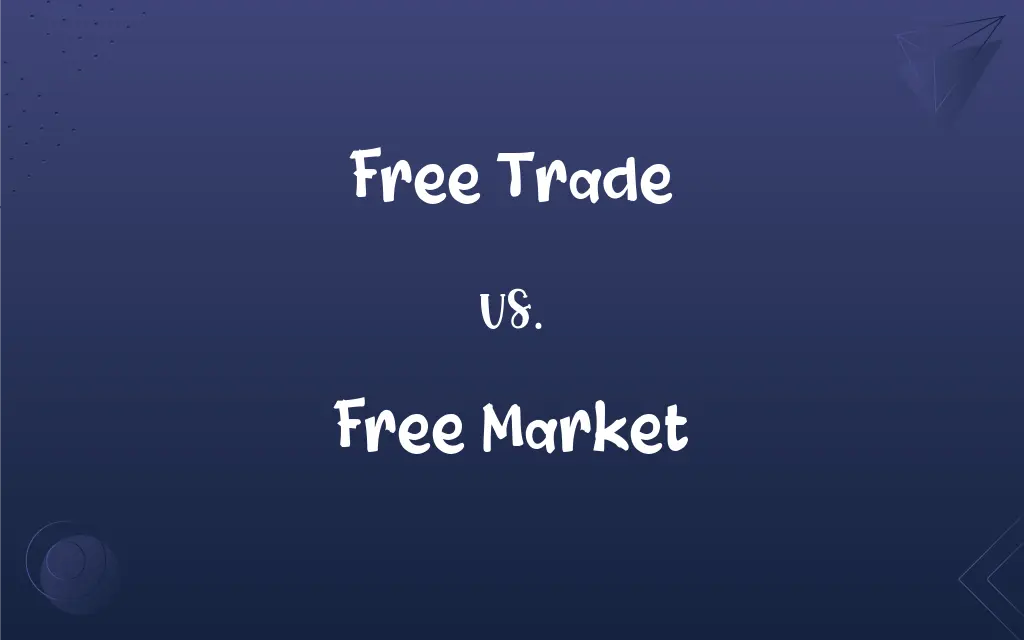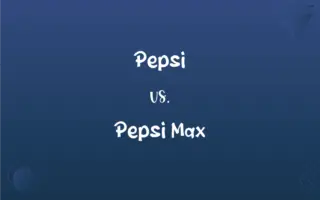Free Trade vs. Free Market: What's the Difference?
Edited by Aimie Carlson || By Janet White || Published on December 22, 2023
Free trade refers to international trade left to its natural course without tariffs, quotas, or other restrictions, while a free market is an economic system where prices are determined by unrestricted competition.

Key Differences
Free trade centers on the absence of barriers in international trade, allowing goods and services to move across borders without tariffs or quotas. While, a free market emphasizes minimal governmental intervention in economic activities, fostering competition.
Free trade applies to international or inter-regional transactions, aimed at enhancing global economic integration. However, a free market principles operate within a country's economy, affecting all aspects of economic transactions.
In free trade, the focus is on reducing or eliminating government-imposed barriers on trade. Whereas, the free market concept involves a broader reduction of government control or regulation in economic activities.
Free trade facilitates international exchange and can lead to specialization and efficiency. Free markets encourage entrepreneurship and innovation due to less regulation and government interference.
Free trade is rooted in the idea of comparative advantage and international cooperation. Free market ideology is based on the belief in individual choice and market forces shaping the economy.
ADVERTISEMENT
Comparison Chart
Definition
Unrestricted international trade
An economic system with little government intervention
Application
Across international borders
Within a country's economy
Main Focus
Removing trade barriers like tariffs and quotas
Promoting competition and reducing regulation
Economic Impact
Enhances global integration and efficiency
Encourages innovation and entrepreneurship
Underlying Philosophy
Comparative advantage, international cooperation
Individual choice, market-driven economy
ADVERTISEMENT
Free Trade and Free Market Definitions
Free Trade
Trade policy aiming at reducing trade barriers.
Free trade benefits consumers by providing a variety of products.
Free Market
An economic system with minimal government intervention.
The free market allows for natural price setting based on supply and demand.
Free Trade
A system encouraging global economic integration.
The WTO advocates for free trade to enhance global cooperation.
Free Market
A system characterized by voluntary exchanges.
The free market principle is fundamental in capitalist economies.
Free Trade
The absence of protective tariffs and restrictive quotas.
Free trade agreements have been crucial in boosting exports.
Free Market
An economy where private entities operate without undue restriction.
The free market encourages competition and innovation.
Free Trade
Trade across borders unencumbered by tariffs and quotas.
Free trade has significantly reduced the cost of imported goods.
Free Market
A market operating under the laws of supply and demand.
In a free market, prices are determined by consumer preferences.
Free Trade
International trade without government-imposed restrictions.
The agreement aimed to promote free trade between the two countries.
Free Market
An economic model favoring less regulation and more competition.
Small businesses often thrive in a free market environment.
Free Market
Of, related to or characteristic of a free market. Lacking wealth redistribution and government regulation.
FAQs
What is free trade?
It's international trade without restrictive tariffs and quotas.
What defines a free market?
An economic system with minimal government intervention and regulation.
What is the key principle of a free market?
Competition and supply-and-demand dynamics guide economic activities.
What role do governments play in free trade?
They negotiate trade agreements but limit intervention in trade policies.
How does free trade benefit countries?
By reducing costs, increasing variety, and enhancing global cooperation.
How does a free market affect consumers?
It often leads to lower prices and more choices for consumers.
Are there disadvantages to free trade?
It can lead to job losses in industries facing international competition.
How do tariffs relate to free trade?
Tariffs are trade barriers that free trade seeks to eliminate.
Does a free market mean no government at all?
Not necessarily; it means limited government intervention, not its absence.
Do free trade policies impact local industries?
Yes, they can create competition for local industries.
Can a free market have negative effects?
Yes, it can result in monopolies and less consumer protection.
Do free trade agreements always benefit all parties?
Benefits can vary, and some sectors may face challenges.
Does free trade affect product quality?
It can lead to better quality through global competition.
How does a free market respond to consumer needs?
It adapts quickly to changes in consumer preferences and demand.
Can free trade lead to economic growth?
Yes, by opening new markets and fostering efficiency.
What is the government's role in a free market?
To ensure fair play while minimizing its interference in economic activities.
Is a free market always fair?
Not always; it can sometimes favor those with more resources.
What are the challenges of maintaining a free market?
Ensuring competition, preventing monopolies, and protecting consumers.
What is a free trade agreement?
A pact between countries to reduce or eliminate trade barriers.
How does competition work in a free market?
Companies compete freely, leading to innovation and better products.
About Author
Written by
Janet WhiteJanet White has been an esteemed writer and blogger for Difference Wiki. Holding a Master's degree in Science and Medical Journalism from the prestigious Boston University, she has consistently demonstrated her expertise and passion for her field. When she's not immersed in her work, Janet relishes her time exercising, delving into a good book, and cherishing moments with friends and family.
Edited by
Aimie CarlsonAimie Carlson, holding a master's degree in English literature, is a fervent English language enthusiast. She lends her writing talents to Difference Wiki, a prominent website that specializes in comparisons, offering readers insightful analyses that both captivate and inform.































































